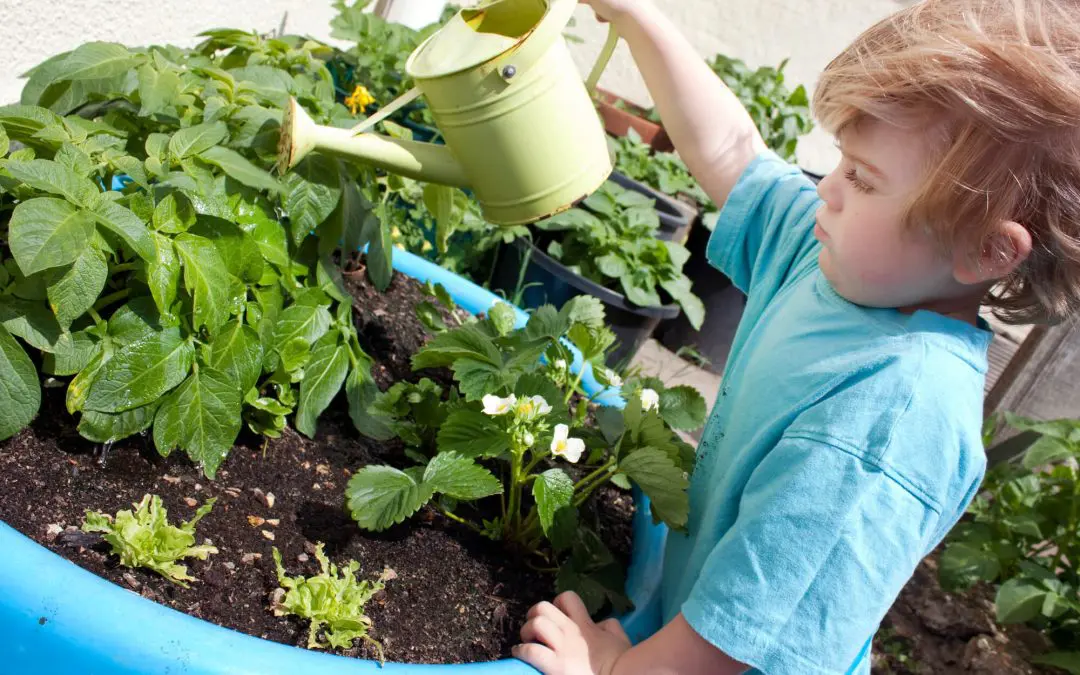Building a family garden is one of the most rewarding ways to teach kids about nature. Gardening with kids offers many benefits, from fostering a sense of responsibility to igniting curiosity about the natural world. In this blog post, we’ll explore the joys and advantages of gardening with children and some tips to make the experience enjoyable for adults and kids alike.
Gardening with Kids Creates Educational Opportunities
Gardening provides an immersive learning environment for kids. From understanding the life cycle of plants to learning about ecosystems and the importance of pollinators, there’s a wealth of knowledge waiting to be discovered in the garden. Children can observe firsthand how seeds sprout, plants grow, and flowers bloom, instilling a sense of appreciation for the natural world.
Healthy Habits
Gardening encourages physical activity and promotes healthy habits. Digging, planting, watering, and weeding are all excellent forms of exercise that engage different muscle groups and help develop motor skills. Growing and harvesting their fruits and vegetables can inspire children to make healthier food choices and develop an understanding of where their food comes from.
Gardening with Kids Builds Responsibility
Taking care of a garden instills a sense of responsibility in children. Assigning them tasks such as watering the plants, pulling out weeds, or monitoring for pests teaches them the importance of commitment and accountability. Watching their efforts translate into the growth and flourishing of plants instills a sense of pride and accomplishment.
Creativity and Imagination
Gardening sparks creativity and encourages imaginative play. Whether designing garden layouts, creating DIY plant markers, or building fairy houses in your flower garden, children can let their imagination run wild in the garden. The outdoor setting provides endless opportunities for exploration and creativity.
Emotional Well-Being
Spending time in nature has been shown to have numerous benefits for mental health, and gardening is no exception. The peaceful and tranquil environment of the garden can help reduce stress and anxiety for both children and adults. Tending to plants and watching them thrive can also instill a sense of calmness and emotional well-being.
Tips for Gardening with Kids
- Start small: Begin with simple gardening projects that are manageable for children. Planting easy-to-grow seeds like sunflowers, radishes, or beans can provide quick results and keep kids engaged.
- Make it fun: Incorporate fun activities into gardening, such as scavenger hunts for bugs, creating garden art, or building miniature landscapes. Let children express their creativity and make the experience enjoyable.
- Provide child-friendly tools: Invest in child-sized gardening tools that are lightweight and easy to handle. Having their own tools can make children feel more involved and independent in the gardening process.
- Encourage exploration: Allow children to explore and interact with the garden freely. Let them touch, smell, and taste different plants (with supervision) to engage their senses and foster a deeper connection with nature.
- Celebrate achievements: Celebrate milestones and achievements in the garden, whether it’s the first sprout peeking through the soil or the first harvest of homegrown vegetables. Positive reinforcement encourages children to stay motivated and enthusiastic about gardening.
Gardening with kids is more than growing plants; it’s about nurturing young minds, fostering a love for nature, and creating cherished memories that will last a lifetime. By involving children in gardening, we impart valuable skills and knowledge and sow the seeds for a deeper appreciation of the world around us.
FAQs for Gardening with Kids
Can gardening be done indoors or in small spaces?
Yes, gardening can be adapted to indoor spaces or small outdoor areas like balconies or patios. Container gardening, vertical gardening, and hydroponics are great options for limited space.
Are there any safety considerations when gardening with kids?
It’s essential to teach kids basic garden safety, such as not eating anything without checking with an adult first and wearing gloves when handling soil or plants. They should also be instructed not to play with garden tools unsupervised.
What are some easy plants to grow with kids?
Some easy plants to grow with kids include sunflowers, cherry tomatoes, lettuce, strawberries, and herbs like basil or mint. These plants typically have quick growth cycles and are visually appealing to children.
At what age can children start gardening?
Children as young as toddlers can start gardening with simple tasks like watering plants or picking fruits and vegetables. As they grow older, they can take on more responsibilities and learn about different aspects of gardening.
Anderson Home Inspections provides inspections to customers in central Ohio. If you’re buying or selling a home, contact us to schedule our services.

